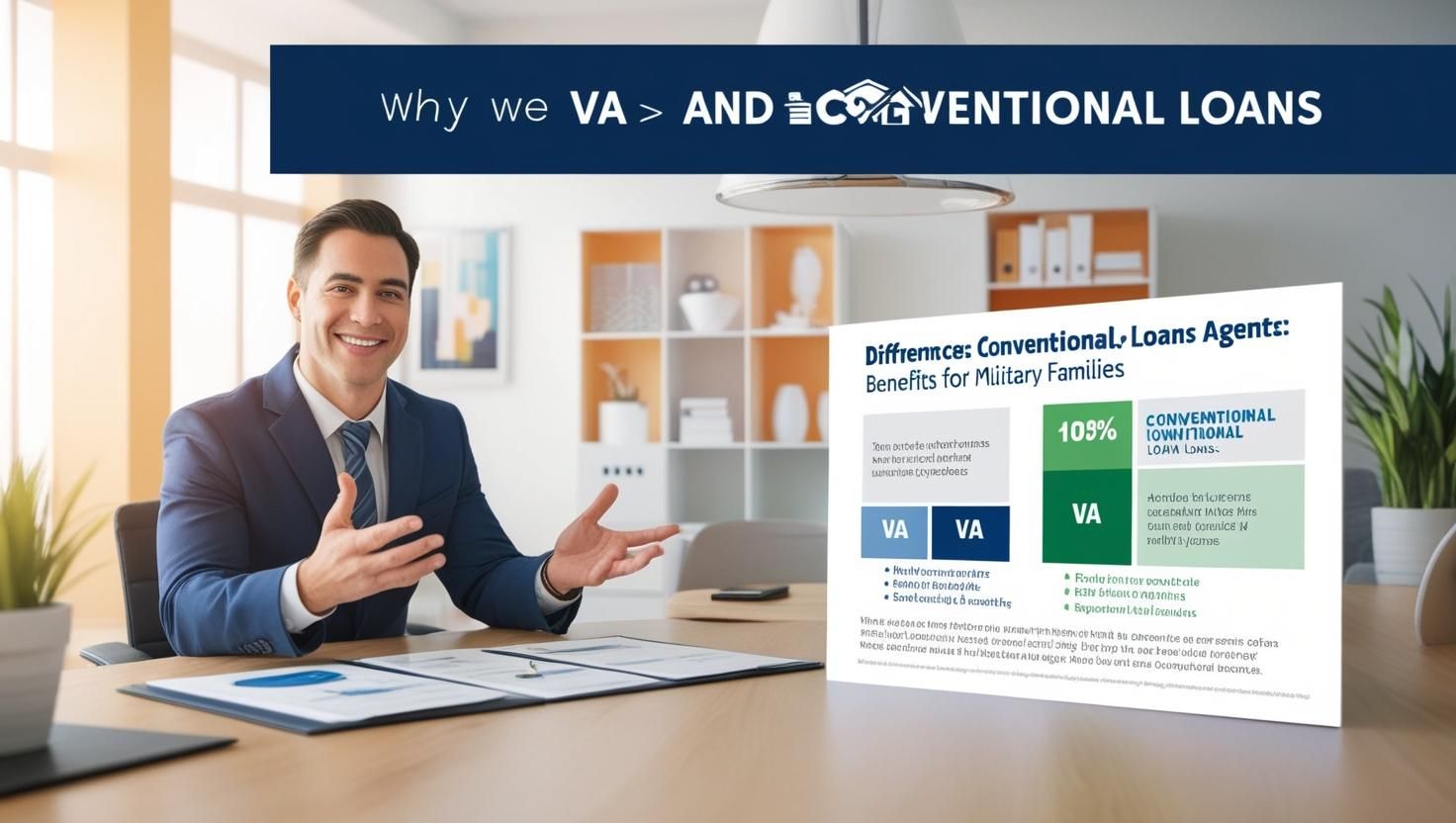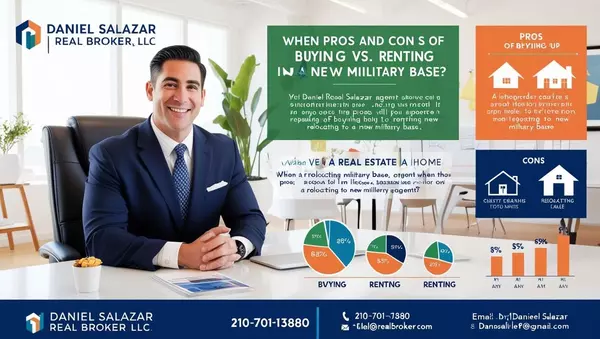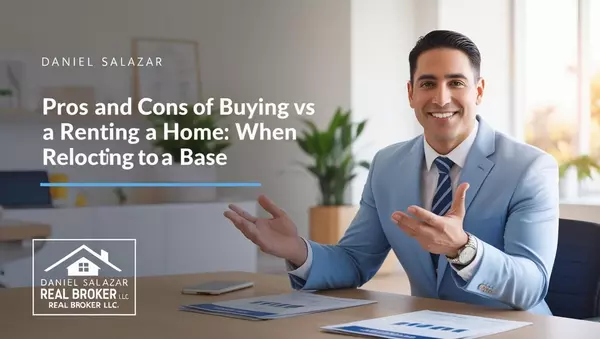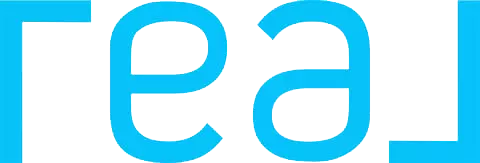VA Loan vs. Conventional Loan: What’s Best for Military Families?

VA Loan vs. Conventional Loan: What’s Best for Military Families?

As a military family, buying a home can be an exciting yet overwhelming experience. One of the most important decisions you’ll need to make is choosing the right type of loan. For military families, two of the most common loan options are VA loans and conventional loans. While both are viable paths to homeownership, understanding the differences between them can help you make an informed choice about what’s best for your unique situation.
In this post, we’ll compare VA loans and conventional loans, highlighting the benefits and drawbacks of each, to help you determine which loan option suits your needs as a military family.
What is a VA Loan?
A VA loan is a mortgage loan backed by the U.S. Department of Veterans Affairs. It is available to veterans, active-duty service members, and eligible surviving spouses. The VA loan program is designed to help military families secure homeownership by offering several key benefits.
Benefits of a VA Loan:
-
No Down Payment: One of the most significant advantages of a VA loan is that it doesn’t require a down payment. This is especially helpful for military families who may not have the ability to save for a large down payment due to frequent relocations or other financial constraints.
-
No Private Mortgage Insurance (PMI): With a conventional loan, if you put down less than 20%, you’re typically required to pay for PMI, which adds to your monthly payment. VA loans do not require PMI, which can save you money each month.
-
Lower Interest Rates: VA loans often come with lower interest rates compared to conventional loans, which can lead to significant savings over the life of the loan.
-
Easier Qualification: The VA loan program is more flexible when it comes to credit score and debt-to-income (DTI) ratio, making it easier for military families to qualify, even if their credit score isn’t perfect.
-
Limited Closing Costs: The VA limits the amount of closing costs that can be passed on to the buyer, which can help reduce out-of-pocket expenses at closing.
Drawbacks of a VA Loan:
-
Funding Fee: While VA loans don’t require a down payment or PMI, there is a funding fee that helps cover the cost of the VA loan program. This fee can vary depending on factors such as whether you’re a first-time or subsequent user of the VA loan benefit. However, some military families may be exempt from this fee, particularly if they have a service-related disability.
-
Property Requirements: The home you purchase with a VA loan must meet certain minimum property requirements (MPRs) to ensure it is safe, sound, and sanitary. This can sometimes limit your options if the home needs significant repairs or renovations.
What is a Conventional Loan?
A conventional loan is a type of mortgage loan that isn’t backed by a government agency. It is offered by private lenders, such as banks and credit unions, and typically requires a down payment and a good credit score. Conventional loans are the most common type of loan for homebuyers who are not eligible for government-backed programs like VA loans or FHA loans.
Benefits of a Conventional Loan:
-
More Flexibility in Loan Amounts: Conventional loans are available in a wider range of loan amounts, and you can borrow more than you could with a VA loan. This makes them a good option if you're looking to purchase a more expensive home.
-
Variety of Loan Types: Conventional loans offer a variety of loan types, including fixed-rate and adjustable-rate mortgages. This flexibility allows you to choose a loan structure that best fits your financial situation and long-term goals.
-
No Funding Fee: Unlike VA loans, conventional loans don’t have a funding fee. However, depending on the down payment amount, you may need to pay PMI if your down payment is less than 20%.
-
Potential for Lower Monthly Payments: If you have a large down payment (20% or more), you can avoid PMI, which can make your monthly payments more affordable.
Drawbacks of a Conventional Loan:
-
Down Payment Requirement: Conventional loans typically require a down payment of at least 5%–20%, depending on the lender and your credit score. For military families, saving for a large down payment may not be feasible, especially if you’ve recently moved or had to use your savings for other expenses.
-
Private Mortgage Insurance (PMI): If you put down less than 20%, you'll likely need to pay for PMI, which can increase your monthly payment. PMI can be removed once you’ve reached 20% equity in your home, but until then, it’s an additional cost to consider.
-
Stricter Credit Requirements: Conventional loans generally have higher credit score requirements than VA loans, which can make it more difficult for military families with less-than-perfect credit to qualify.
VA Loan vs. Conventional Loan: Which is Best for Military Families?
Now that we’ve broken down the pros and cons of VA loans and conventional loans, let’s take a closer look at which option is best suited for military families.
Why a VA Loan Might Be the Best Option:
-
No Down Payment Required: Many military families may not have the time or resources to save for a down payment due to frequent moves and other financial commitments. A VA loan’s no-down-payment option makes it an attractive choice.
-
Lower Interest Rates: VA loans often offer lower interest rates, which can lead to lower monthly payments and substantial long-term savings.
-
No PMI: VA loans don’t require PMI, which is a major cost-saving advantage over conventional loans, where PMI can add a significant amount to your monthly mortgage payment.
-
Easier Qualification: Military families with less-than-perfect credit or higher debt may find it easier to qualify for a VA loan due to more flexible underwriting requirements.
Why a Conventional Loan Might Be the Best Option:
-
Larger Loan Amounts: If you’re looking to buy a higher-priced home or if you’re located in a high-cost area, a conventional loan may offer more flexibility in terms of loan amounts than a VA loan.
-
No Funding Fee: If you can afford a substantial down payment (20% or more), you can avoid the funding fee and PMI, which could make a conventional loan a good option.
-
Variety of Loan Options: Conventional loans offer a wider range of loan options and flexibility in terms of interest rates and loan structures.
Conclusion
For most military families, a VA loan is the better option because of its no down payment, no PMI, and more favorable terms. However, depending on your specific needs, a conventional loan could also be a good choice, especially if you're buying in a higher price range or can make a significant down payment.
Ultimately, it’s important to speak with an experienced lender who understands both VA and conventional loan options, and a knowledgeable real estate agent who can help guide you through the process. As a realtor, I’m here to help military families like yours find the perfect home and navigate the homebuying process with ease.
Contact Realtor Daniel Salazar
If you’re ready to explore your options with a VA loan or conventional loan, I’m here to help! With experience assisting military families, I can help you find the best loan for your needs and guide you every step of the way.
Realtor: Daniel Salazar
Company: REAL Broker LLC
Phone: 210-701-3880
Email: dansalre11@gmail.com
Let’s make your dream of homeownership a reality today!
Categories
Recent Posts











